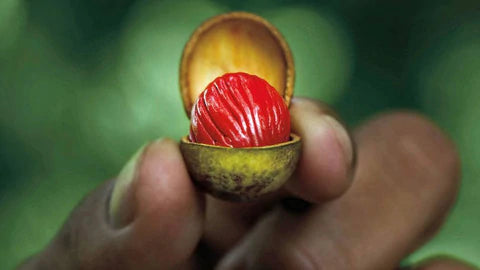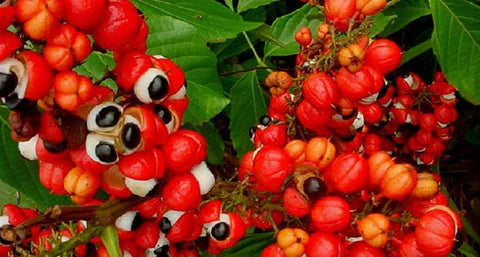Article: The Wonders of Ucuuba Butter

The Wonders of Ucuuba Butter

The Ucuuba is the fruit of the Ucuubeira tree, present in the wetlands, riverbanks, and streams of the Amazonian regions, more precisely in the forests of Varveza and Igapos.
When ripe, the fruits of the Ucuubeira are detached from the tree, the red seeds separated and because of their lightweight, they float on the flooded areas, which forms a nice red carpet rippling accordingly with the rhythm of the currents. These red, ribbed, highly recognizable seeds bring color to the deep green of the Amazon rainforest.
In addition, these precious seeds contain a delicate butter with intense nourishing and moisturizing powers and a soft, velvety texture. Thanks to its ultra-lightweight texture, Ucuuba butter is perfect for moisturizing and repairing even the driest skins without leaving a greasy or sticky effect.
THE STORY OF THE UCUUBA TREE
In the Tupi language, the dialect of the Amazonian peoples, Ucuuba means "butter tree", its etymology comes from the words UKU (fat) and UBÁ (tree). Formerly used in popular medicine for the treatment of many diseases, the Indians carried, during their voyage, the Ucuuba serum extracted from the seeds for use on the wounds.
Today, the butter extracted from Ucuuba seeds can be used to manufacture cosmetics, candles, and fragrances. Butter has several uses in everyday medicine, mainly in the treatment of rheumatism, arthritis, ...The history of the Ucuuba ingredient has undergone different phases. First, the red seed harvest peaked in the years 1960-1970, when used in the cosmetic and pharmaceutical industries. The big turning point took place in 1954 when an American Air Force pilot detected the large concentration of Ucuuba in the Marajó Island area and sent wood samples to Georgia Pacific Co. For testing.
The tests demonstrated the excellent quality of the wood for the wood industry. This discovery has been dramatic for this tree, since it made the Ucuuba, until today one of the most exported wood species of the Amazonian estuary..
FROM OVER TO SUSTAINABLE EXPLOITATION OF THE UCUUBA
The cutting of Ucuuba trees has thus become a common practice in the regions of Amazonia, with local populations gradually abandoning the fruit harvest. Ucuuba wood is a species that has great economic potential, its wood being used in the manufacture of veneer, plywood, packing, toys, pencils, etc. Because of this predatory exploitation, this species of tree, yet so precious, has been placed on the list of endangered species of IBAMA * in 1992. It is at this moment that Natura plays an important role.
The new Natura Ekos Ucuuba line promotes the sustainable exploitation of Ucuuba by giving added value to this tree. Natura gives special attention to the chain of production. The Ucuuba is no longer used solely for its wood but also for its seeds. And by harvesting its seeds durably, the families of our partner communities multiply by 3 their incomes, compared to the sale of wood alone.
This conscious harvest makes possible the reasoned culture and the sustainability of the forests. The production of Ucuuba and other ingredients used by Natura in the Amazon helps to preserve areas at risk of deforestation representing the equivalent of 70 000 football fields and allows the employment of more than 1100 families in the region Of Ribeirao in the Amazon, in a fair trade cycle.
Today, thanks to the action of the local populations in the Amazonian estuary, Ucuuba is no longer in the new list of IBAMA of endangered species. It is a concrete example of joint action in favor of the environment.

Try our Ucuuba Dream Cream



Leave a comment
This site is protected by hCaptcha and the hCaptcha Privacy Policy and Terms of Service apply.